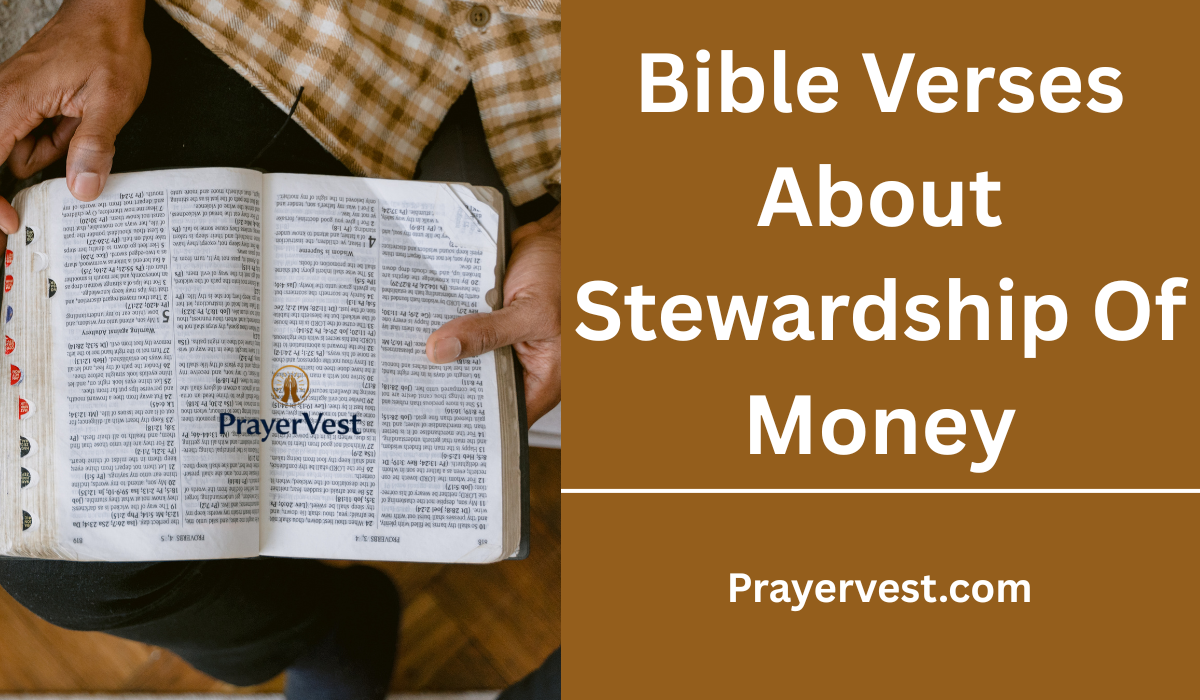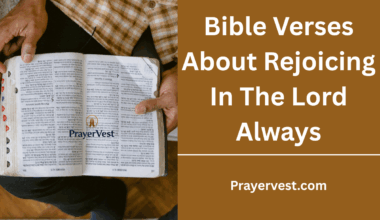Bible Verses About Stewardship Of Money. A fundamental biblical concept, stewardship of money represents how we worship God with the riches He has entrusted to us and goes beyond simple money management. Everything we own ultimately belongs to the Lord, according to the Bible, and we are obligated to manage it sensibly, dutifully, and honorably.
Scripture emphasizes time and again, both in the Old and New Testaments, that money is a tool, not a master, and that our financial decisions show how we feel about God. We recognize God as our ultimate source and match our financial practices with His purposes when we adopt biblical stewardship.
It is simple to fall into the traps of materialism, excessive spending, and putting our security in material possessions in today’s environment. The spiritual influence of how we use our possessions might have eternal significance, but God’s Word cautions us that wealth is fleeting.
The Bible warns against greed and the love of money while promoting diligence, generosity, and contentment. Budgeting sensibly, giving generously, conserving, and utilizing wealth to further God’s kingdom and help others are all components of true stewardship. By managing our money according to biblical principles, we may save for future treasures in addition to meeting our immediate needs.


For believers who want to manage their resources in a way that pleases God, these Bible verses on financial stewardship provide direction, support, and correction. Scripture offers eternal truth for every financial decision, whether it is practicing sacrificial giving, learning to trust God in uncertain financial circumstances, or using wisdom in spending and investing. May these scriptures encourage you to view your finances as a gift from God that should be handled with thankfulness, humility, and purpose rather than as your personal property. By doing this, you improve your spiritual relationship with the Lord and fortify your financial stability.
40 Inspiring Bible Verses About Stewardship Of Money (2026)
1. Psalm 24:1
“The earth is the Lord’s, and everything in it, the world, and all who live in it.”
This verse sets the foundation for true biblical stewardship by reminding us that everything we own ultimately belongs to God. Our possessions, wealth, and resources are not self-made achievements but divine trusts given for a purpose. In the context of managing money, this means that we are caretakers, not owners, of our financial blessings. Recognizing God’s ownership helps us approach money with humility and accountability, using it to honor Him rather than ourselves.
2. Psalm 50:10
“For every animal of the forest is mine, and the cattle on a thousand hills.”
Here, God declares His complete sovereignty over creation and all material wealth. The imagery of owning “the cattle on a thousand hills” communicates limitless abundance and absolute authority. For the believer, this truth is reassuring—it reminds us that God is the ultimate provider and that our financial stability rests in His hands, not in economic systems or personal effort alone. When we acknowledge His ownership, we are freed from the anxiety of scarcity and inspired to give generously, knowing we serve a God of infinite resources.
3. Psalm 112:5
“Good will come to those who are generous and lend freely, who conduct their affairs with justice.”
This verse beautifully connects generosity with divine favor. God’s Word teaches that blessing follows those who give freely and manage their finances with fairness and integrity. In stewardship, generosity is not reckless giving but intentional sharing from a heart aligned with God’s purposes. Conducting financial affairs “with justice” means being honest in business, fair in dealings, and mindful of the needs of others. Such stewardship reflects God’s character and opens the door to His continued provision.
4. Psalm 37:21
“The wicked borrow and do not repay, but the righteous give generously.”
Here, financial responsibility and generosity are contrasted. The righteous are depicted as givers—people who manage their resources wisely enough to meet obligations and still extend help to others. In contrast, the wicked live irresponsibly, creating debt without repayment. This verse teaches that stewardship involves both avoiding harmful financial habits and actively blessing others. A heart of generosity is a hallmark of godly money management, and it stems from trust in God’s ongoing provision.
5. Psalm 119:36
“Turn my heart toward your statutes and not toward selfish gain.”
Stewardship is not just about numbers; it is deeply tied to the condition of the heart. This prayer from the psalmist reveals a desire for God’s Word to guide every decision, including those related to money. Selfish gain can easily distort stewardship, leading to greed and exploitation. But when our hearts are anchored in God’s statutes, we are equipped to handle wealth with humility, purpose, and generosity, ensuring our resources serve God’s glory rather than our ambition.
6. Psalm 62:10
“Though your riches increase, do not set your heart on them.”
This verse delivers a critical warning about wealth—having money is not sinful, but setting your heart on it is dangerous. God calls us to hold wealth loosely, understanding that material possessions are temporary and can never replace the security found in Him. In stewardship, this means enjoying God’s blessings without idolizing them, and remembering that our ultimate treasure is in His presence, not in our bank accounts.
7. Psalm 34:10
“The lions may grow weak and hungry, but those who seek the Lord lack no good thing.”
The psalmist uses the imagery of lions—symbols of strength and self-reliance—to show that even the powerful experience need. But those who depend on the Lord will always have their needs met. Stewardship of money begins with this trust: God will provide. This truth frees us to manage resources generously rather than hoarding them out of fear, knowing that God’s provision is constant and sufficient.
8. Psalm 15:5
“Who lends money to the poor without interest; who does not accept a bribe against the innocent.”
This verse highlights financial ethics in stewardship. Lending without exploitation and refusing corrupt gain are marks of integrity that honor God. True stewardship requires not only wise management but also compassion toward those in need. When we use our financial influence to uplift rather than exploit, we reflect the just and merciful heart of God.
9. Psalm 49:16-17
“Do not be overawed when others grow rich, when the splendor of their houses increases; for they will take nothing with them when they die, their splendor will not descend with them.”
Wealth can create illusions of power and permanence, but this verse reminds us that material riches are left behind at death. Stewardship focuses not on competing with the wealthy but on using our resources for eternal purposes. Our financial legacy is not measured by possessions but by the lives we touch through generosity and godly living.
10. Psalm 37:16
“Better the little that the righteous have than the wealth of many wicked.”
This verse flips worldly values upside down—righteousness is worth more than riches. God’s blessing over a modest income is greater than the corruption often tied to immense wealth. For the steward of money, this means valuing honesty, integrity, and faithfulness over high returns gained through questionable means. God multiplies the impact of even small resources when they are handled in alignment with His will.
11. Psalm 112:9
“They have freely scattered their gifts to the poor, their righteousness endures forever; their horn will be lifted high in honor.”
Generosity is portrayed here as both a spiritual act and a lasting legacy. Those who give to the poor leave behind more than financial impact—they leave a testimony of righteousness that echoes through generations. This is the essence of stewardship: using temporal wealth to build an eternal reputation of faithfulness and compassion.
12. Psalm 41:1
“Blessed are those who have regard for the weak; the Lord delivers them in times of trouble.”
Stewardship includes sensitivity to the needs of the vulnerable. God promises protection and blessing to those who care for the weak, including the financially disadvantaged. Wise money management allows us to be positioned to help others generously, which in turn invites God’s favor into our own lives.
13. Psalm 4:5
“Offer the sacrifices of the righteous and trust in the Lord.”
Financial stewardship sometimes requires sacrificial giving—choosing God’s work over personal comfort. This verse ties such sacrifice to trust, reminding us that God sustains those who honor Him first. When we release resources for kingdom purposes, we step into a cycle of divine provision and blessing.
14. Psalm 37:25
“I was young and now I am old, yet I have never seen the righteous forsaken or their children begging bread.”
This verse stands as a lifelong testimony of God’s provision. It assures stewards that when we walk in righteousness—including financial integrity—God not only meets our needs but also watches over our families. Trusting in this promise allows us to give generously and manage money without fear of lack.
15. Psalm 23:1
“The Lord is my shepherd, I lack nothing.”
The most well-known Psalm begins with a declaration of total trust. True stewardship is anchored in this reality: because God is our shepherd, we are never without provision. This perspective frees us from anxiety over finances and enables us to handle wealth with gratitude, generosity, and contentment.
16. Psalm 16:5
“Lord, you alone are my portion and my cup; you make my lot secure.”
This verse redefines security, not as financial wealth, but as God Himself. In stewardship, it reminds us that even if resources fluctuate, our ultimate stability rests in Him. A steward who sees God as their portion will manage money with faithfulness, knowing that their real inheritance is eternal.
17. Psalm 119:72
“The law from your mouth is more precious to me than thousands of pieces of silver and gold.”
Here, the psalmist places God’s Word above material riches. This perspective is crucial for stewardship—our financial decisions should be guided by Scripture, not greed. When God’s wisdom directs our finances, even modest means can yield great spiritual wealth.
18. Psalm 37:7
“Be still before the Lord and wait patiently for him; do not fret when people succeed in their ways, when they carry out their wicked schemes.”
Stewardship sometimes means resisting the urge to chase quick gains, especially when others prosper through questionable means. This verse calls for patience and trust, knowing that God rewards integrity far more than ill-gotten wealth.
19. Psalm 112:3
“Wealth and riches are in their houses, and their righteousness endures forever.”
God’s blessings can include material provision, but the true treasure is righteousness. Good stewardship allows both—resources in the home and a spiritual legacy that lasts for eternity.
20. Psalm 128:2
“You will eat the fruit of your labor; blessings and prosperity will be yours.”
Hard work and faithful stewardship often lead to abundance. This verse affirms that prosperity is not a sin when it flows from honest work and is enjoyed with gratitude toward God.
21. Psalm 85:12
“The Lord will indeed give what is good, and our land will yield its harvest.”
God is both the giver and sustainer of our resources. This verse reassures stewards that as they honor God, He will ensure their needs are met through His faithful provision.
22. Psalm 31:19
“How abundant are the good things that you have stored up for those who fear you.”
Stewardship is motivated by the understanding that God stores up blessings for those who revere Him. This inspires us to handle money faithfully, knowing greater rewards—both earthly and eternal—are ahead.
23. Psalm 67:6
“The land yields its harvest; God, our God, blesses us.”
This verse ties provision directly to God’s blessing. A faithful steward sees every income, investment, and resource as a harvest God has allowed, and thus manages it with humility and purpose.
24. Psalm 119:14
“I rejoice in following your statutes as one rejoices in great riches.”
A true steward treasures obedience to God’s Word more than accumulating wealth. This verse teaches that joy comes from walking in God’s ways, not from the size of a bank account.
25. Psalm 34:8-9
“Taste and see that the Lord is good; blessed is the one who takes refuge in him. Fear the Lord, you his holy people, for those who fear him lack nothing.”
Financial stewardship rests on the promise that God’s goodness ensures we will not lack what we truly need. This truth allows us to live generously without fear.
26. Psalm 40:17
“But as for me, I am poor and needy; may the Lord think of me. You are my help and my deliverer; you are my God, do not delay.”
This verse acknowledges dependence on God even in financial lack. Stewardship is not only for the wealthy—it’s about trusting God and managing whatever resources we have with faithfulness.
27. Psalm 84:11
“No good thing does he withhold from those whose walk is blameless.”
God’s generosity is perfect. Stewards can rest knowing that as they walk in integrity, God will supply every good thing needed for their lives and ministries.
28. Psalm 37:3-4
“Trust in the Lord and do good; dwell in the land and enjoy safe pasture. Take delight in the Lord, and he will give you the desires of your heart.”
True stewardship flows from trust and delight in God. When He is our joy, our desires align with His will, leading to wise and godly use of resources.
29. Psalm 68:10
“Your people settled in it, and from your bounty, God, you provided for the poor.”
God’s provision is abundant and inclusive, extending to the most vulnerable. Stewards are called to mirror this generosity, ensuring their management of money benefits those in need.
30. Psalm 92:12
“The righteous will flourish like a palm tree, they will grow like a cedar of Lebanon.”
While not directly about finances, this verse illustrates the stability and growth that come from righteous living—a principle that applies to stewardship. When managed God’s way, resources grow in ways that honor Him.
31. Psalm 119:11
“I have hidden your word in my heart that I might not sin against you.”
Financial integrity starts in the heart. When God’s Word is rooted in us, we are better equipped to resist greed, dishonesty, and poor stewardship.
32. Psalm 37:6
“He will make your righteous reward shine like the dawn, your vindication like the noonday sun.”
Faithful stewardship may not bring instant recognition, but God promises to reward those who manage His resources with integrity.
33. Psalm 81:10
“Open wide your mouth and I will fill it.”
This verse speaks of God’s readiness to provide. As stewards, we must live in dependence on Him, believing He can fill every financial and spiritual need.
34. Psalm 115:14-15
“May the Lord cause you to flourish, both you and your children. May you be blessed by the Lord, the Maker of heaven and earth.”
Stewardship has generational impact. God’s blessing extends beyond our own lives when we handle resources faithfully.
35. Psalm 107:9
“For he satisfies the thirsty and fills the hungry with good things.”
God’s provision is not just about sufficiency—it is about satisfaction. Stewards who rely on Him will find that He meets needs in abundance and goodness.
36. Psalm 37:18-19
“The blameless spend their days under the Lord’s care, and their inheritance will endure forever. In times of disaster they will not wither; in days of famine they will enjoy plenty.”
This verse reassures stewards that God’s care is constant, even in economic hardship. His provision is not bound by market trends or human limitations.
37. Psalm 23:5
“You prepare a table before me in the presence of my enemies. You anoint my head with oil; my cup overflows.”
Overflowing provision is God’s way of showing His faithfulness. Stewards are called to share that overflow with others.
38. Psalm 34:5
“Those who look to him are radiant; their faces are never covered with shame.”
Financial shame often comes from mismanagement, but looking to God restores dignity and provides wisdom for responsible stewardship.
39. Psalm 65:11
“You crown the year with your bounty, and your carts overflow with abundance.”
God’s blessings are seasonal and abundant. Good stewardship means preparing for seasons of harvest and using them to bless others.
40. Psalm 72:12-13
“For he will deliver the needy who cry out, the afflicted who have no one to help. He will take pity on the weak and the needy and save the needy from death.”
Stewardship is deeply connected to compassion. This verse reminds us that God’s heart is for the needy, and our financial management should reflect that same priority.
Conclusion
In summary, good financial management is a spiritual discipline that reflects our connection with God and goes beyond simple financial principles. All of our resources are gifts from Him, given to us with a specific purpose. We learn to manage money wisely, generously, and honorably by adhering to biblical teachings, which guarantees that our financial choices are in accordance with God’s desire. We show our confidence and trust in the Lord’s provision by helping people in need, contributing to the Gospel’s mission, or practicing responsible money management.
In the end, good financial stewardship causes us to refocus our attention from material belongings to long-term goals. Although wealth is fleeting, the way we utilize it can have a long-lasting spiritual effect, as the Bible teaches us. We put ourselves in a position to receive God’s benefits and serve as conduits for His blessings by adopting an attitude of thankfulness, practicing contentment, and asking His guidance in all financial decisions. In addition to finding financial serenity, managing money in God’s way exalts His name.






